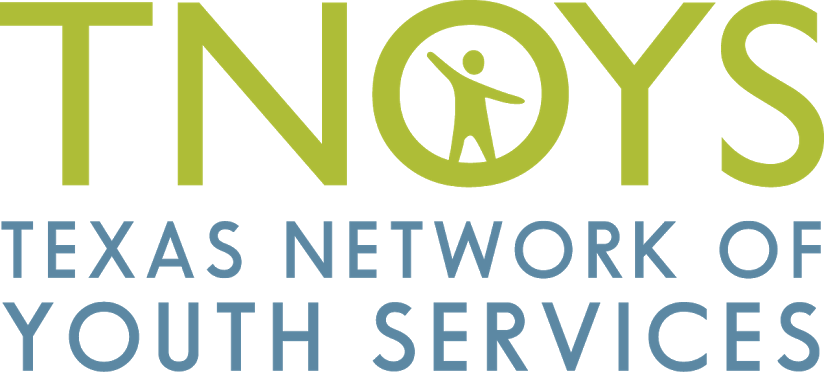TNOYS provides this directory as a resource to help identify member organizations across Texas that offer youth and family services. You can browse listings below according to the region or the type of service you are looking for or click to view the full list. Descriptions of the different types of programs included in the directory are provided below.
All organizations listed are members of TNOYS. To learn more about our network and how you can become a TNOYS member, click here.
- Program Type (63)
- Child-placing Agency (6)
- CYD: Community Youth Development (7)
- Emergency Shelter (18)
- Foundation (1)
- HIP: Help through Intervention and Prevention (3)
- HOPES: Health Outcomes through Prevention and Early Support (7)
- Host Homes (1)
- Maternity Group Home (2)
- Mental and Behaviorial Health (3)
- Preventive Counseling/Mentoring Services (29)
- Residential Treatment Center / General Residential Operation (10)
- Resource or Drop-In Center (33)
- School-based Resources (8)
- Supervised Independent Living (6)
- Family and Youth Success (FAYS) (14)
- Street Outreach Program (13)
- Transitional Living Program (17)
- Region (63)
Descriptions of Program Categories
- Drop-In or Resource Center: These are places where runaway and homeless youth can come without an appointment to get advice or information, receive services or service referrals, or to meet other runaway or homeless youth. These centers are another point of connection for young people who may not want to go to shelters and are a way to engage them in relationships and provide basic services.
- Emergency Shelter: Once youth become homeless, there is an immediate need to find temporary, emergency housing. 46 Emergency shelters are designed to respond to this immediate need for shelter. Youth shelters are licensed by DFPS as General Residential Operations and are often contracted as residential child care providers to serve children and youth in foster care.
- Host Home: Emergency placements for youth experiencing homelessness that are provided by either trained hosts who provide temporary shelter in their homes or made through agreements with young people in the youth’s natural support network such as teachers or parents of friends.
- Maternity Group Home: These programs support homeless pregnant and/or parenting young people between the ages of 16 and 22, as well as their dependent children. Services are provided for up to 21 months, or until a young person turns 18 years old if they enter a program at age 16. The homes teach young people parenting skills as well as child development, family budgeting, health and nutrition, and other skills.
- Permanent Supportive Housing: A few programs across the state provide supportive housing in apartment-based locations with case management services for those who have been determined to be chronically homeless and to have a disabling condition.
- Preventive Counseling Services: Counseling and therapeutic support services to families where youth are at-risk of running away or being kicked out.
- Preventive Counseling Services – Services to At-Risk Youth (“STAR”): A statewide state-funded program designed to prevent youth homelessness by resolving family conflict and keeping youth at home safely with their families. Through STAR, DFPS contracts with community-based organizations to provide family counseling and other crisis intervention services to children and youth up to age 17 and their families in all 254 Texas counties. The program focuses primarily on working with youth dealing with family conflict, truancy, and misdemeanor offenses.
- Street Outreach Program: These programs are generally connected to agencies that provide other services and they are specifically focused on helping young people get off the streets. They generally employ outreach workers to build relationships with runaway, homeless and street youth.
- Supervised Independent Living (SIL): A type of voluntary Extended Foster Care placement where young adults can live on their own, while still getting casework and support services to help them become independent and self-sufficient. It is available in a variety of settings for young adults in Extended Foster Care who are ages 18 to 22.
- Transition Center: Transition Centers provide a central clearinghouse of one-stop services to serve the diverse needs of current and former foster youth, homeless youth, or other at-risk youth. Services may include employment assistance, training, educational support, access and referrals to community partners and resources and various transitional living services.
- Transitional Living Program: An environment set aside for transitional living and programmatic services that are generally designed for a group of older youth, rather than individually designed services for youth. A transitional living program allows opportunities for youth to start early to build a strong foundation of life skills and community connections.
Program Tags
- CSEY Service Provider: Organizations with this tag provide services to victims of Commercial Sexual Exploitation of Youth (CSEY). This can include drop-in and emergency shelters that provide specialized care and services. Many of these organizations also offer services for youth who are not CSEY victims. Click the link above to see CSEY Service Providers. Please Note: If you have concerns that a youth may be a victim of commercial sexual exploitation, please notify the proper authorities.
- Report suspected abuse to DFPS:
- By phone: 1-800-252-5400.
- Online via the Texas Abuse Hotline Website.
- To access care coordination for a minor child victim of trafficking, call the National Human Trafficking Hotline at 1-888-373-7888.
- If the situation is an emergency or you believe someone is in immediate danger, call 911.
- Report suspected abuse to DFPS:
TNOYS Member Organizations
TNOYS’ member organizations offer a wide range of services for youth and families across Texas. Please view our member map for more information on individual member organizations (below). Organizations that are marked with a star operate Family and Youth Success (FAYS) programs.
